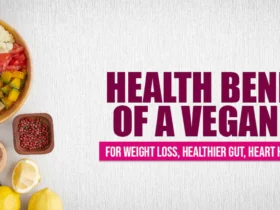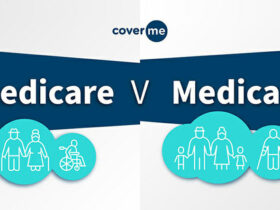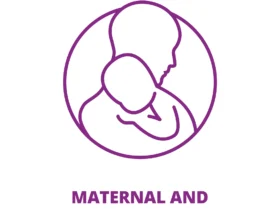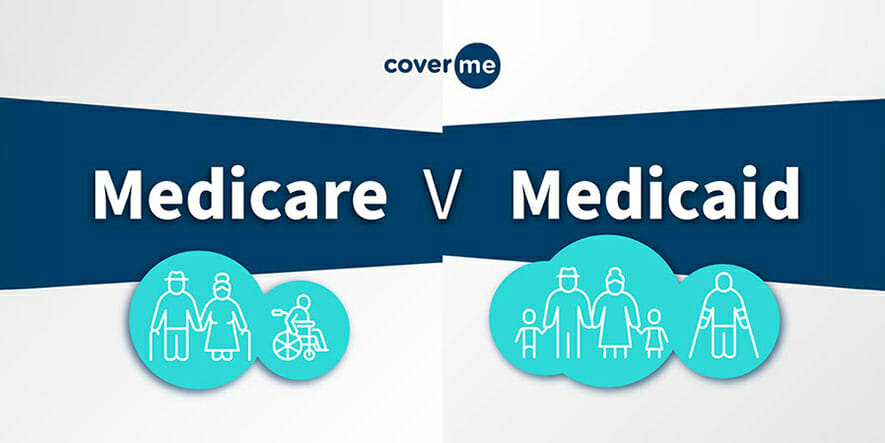Medicare vs. Medicaid: What’s the Difference and Which to Choose?
Arguably the most important component of looking at any healthcare setup are the type of options available, especially if one is considering Medicare or Medicaid. These are both taxpayer-funded health insurance programs, but one is designed for those in need who may not otherwise have the option to receive care and thus has very different coverage options compared with eligibility standards. Whether you are researching Medicare vs. Medicaid for yourself or a loved one, it is important to understand the core distinctions between these programs and when they may serve as a better fit over another option.
In this piece, we will take a look at Medicaid vs. Medicare from several angles such as their differences and eligibility in order to know the best program fit for you or your family.
What is Medicare?
Medicare is a federal health insurance program for people who are 65 or older, and some younger individuals who have disabilities or specific medical conditions. Medicare is paid for through a mix of payroll taxes, and then divided into different facets that cover various medical services.
Parts of Medicare
Medicare has four parts that provide different types of coverage:
- Medicare Part A (Hospital Insurance) — may cover inpatient hospital stays, care in a skilled nursing facility, hospice care, and some home health services.
- Medicare Part B (Medical Insurance): Helps cover doctors’ services, outpatient care, medical supplies, and preventative health.
- Medicare Part C (Medicare Advantage plans): An alternative to Original Medicare that allows beneficiaries with Part A and Part B coverage to receive all of their health care services through a single private plan, provided by insurance companies. They may also include extra benefits, such as vision, dental, and hearing care.
- Medicare Part D (Prescription Drug Program): Helps pay for prescription drugs!
Top SEO and Huge CPC Keywords: Medicare Part A, Medicare Part B, Medicare Part C, Medicare Advantage, Medicare Part D, federal health insurance, outpatient care.
What is Medicaid?
Medicaid is a state and federal program that helps with medical costs for some people with limited income who meet specific eligibility criteria requirements in each separate state, including women who are pregnant. Medicaid has different eligibility requirements depending on what state you are in, but Medicaid is a program designed to provide extensive health coverage for those who could not afford such care.
Medicare, which serves the elderly almost exclusively, and Medicaid for people of any age included in eligibility groups. It includes a wide range of services and generally has no co-pays or very minimal out-of-pocket costs.
Medicaid Services Included:
- Hospital Inpatient and Outpatient Services
- Preventative Care, Doctor Visits
- Prescription Medications
- Long-Term Care
- Vision and Dental Care
- Behavioral Health Services
Top Keywords for SEO and CPC: Medicaid program, state federal program, low-income health insurance, long-term care, Medicaid eligibility.
Medicare vs. Medicaid Eligibility
Who Qualifies for Medicare?
To be a beneficiary of Medicare, you should:
- Be 65 years old or older, or
- Have a qualifying disability and are under 65, or
- Evidence of your End-Stage Renal Disease (ESRD) or Amyotrophic Lateral Sclerosis (ALS).
People generally qualify for premium-free Medicare Part A if they or their spouse paid Medicare taxes while working. If you did not, then it is possible to pay a premium for your Medicare Part A.
Who Qualifies for Medicaid?
How does Medicaid eligibility work? Mostly, it depends on how much income you make. It all depends on the state, but typically you’ll need to be:
- Low-income in your state’s category.
- A pregnant woman or a child under the age of 18.
- Over 65, and meet your state’s income & asset limit.
- A person with disabilities who is within your state income limits.
- Adults with Medicaid-eligible household incomes (up to 100% FPL in partially expanding states, and up to 138% FPL in full-expansion states).
Top Keywords for SEO and CPC: Medicare eligibility, Medicaid eligibility, federal poverty level, Affordable Care Act (ACA) Medicaid expansion, low-income health coverage.
Differences in Medicare and Medicaid
1. Who They Serve
- Medicare serves people aged 65 and over, and nearly two-thirds of its funding comes from taxpayers. People younger than this with ESRD or ALS experience will also be served through Medicare.
- Medicaid serves people of all ages but predominantly low-income individuals and certain people with disabilities. Medicaid will also pay for nursing home and long-term care services that Medicare does not cover.
2. Cost Differences
- Medicare includes premiums, deductibles, and coinsurance. For example, Medicare Part B requires a monthly premium, and there may be other costs specific to certain types of plans like Prescription Drug Plans.
- Medicaid is often free or low-cost for beneficiaries. While some states may impose copayments for certain services, out-of-pocket costs tend to be low.
3. Coverage of Long-Term Care
- Medicare provides only limited long-term care coverage—usually after a hospital stay and for about 100 days at most in a skilled nursing facility.
- Medicaid is the primary payer for long-term care services in the U.S. Medicaid pays for nursing home care and, in some states, may also cover at-home long-term care services.
4. Prescription Drug Coverage
- Medicare Part D offers prescription drug coverage, but it requires beneficiaries to choose a Part D plan or a Medicare Advantage Plan that includes drug coverage.
- Medicaid covers prescription drugs in every state, often with no or very low co-pays.
Best Keywords for SEO and CPC: Medicare Part D, Medicaid prescription drug coverage, prescription drug costs, long-term care coverage, Medicare vs Medicaid costs.
How to Decide: Choose Medicare if:
- You are 65 or older or qualify due to disability.
- You have worked for over 10 years and qualify for premium-free Part A.
- You are looking for a federal health insurance option covering a wide spectrum of medical services and prescription medications.
Choose Medicaid if:
- You meet your state’s poverty line income and need low-cost or cost-free health insurance.
- You or a family member need long-term care that Medicare will not cover.
- You are under 65 and qualify due to disability or low income.
Best Keywords for SEO and CPC: choose Medicare, choose Medicaid, Medicare long-term care, low-income health coverage.
You Can Have Both Medicare and Medicaid — Here’s How
Some individuals qualify for both Medicare and Medicaid. These are known as dual-eligible beneficiaries. Medicare serves as the primary insurance, while Medicaid may cover additional services like long-term care or out-of-pocket costs for prescription drugs.
SEO and CPC Titles: dual-eligible beneficiaries, Medicare and Medicaid together, Medicaid secondary insurance, Medicare prescription plans.
Summary: Medicare vs. Medicaid – Which to Choose?
Whether you choose Medicare or Medicaid will depend on your age, income, and healthcare needs. Medicare is best if you’re 65 or older, while Medicaid is better for low-income individuals or those with disabilities. For those who qualify for both, having Medicare and Medicaid together can provide a comprehensive healthcare safety net.



















Leave a Reply